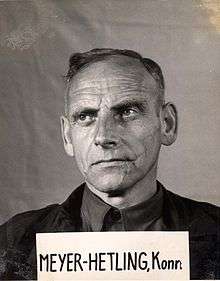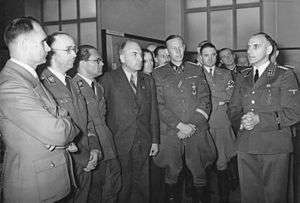Konrad Meyer
Konrad Meyer or Konrad Meyer-Hetling (15 May 1901 – 25 April 1973) was a German agronomist. He is known for his involvement in the development of the infamous Generalplan Ost.


Meyer was born in Salzderhelden near Einbeck, in southern Lower Saxony, as the son of a school teacher.[1] He studied agronomy at the University of Göttingen and received his doctorate in 1926 with a thesis on crop production.[1] He became an assistant at the university and did his habilitation in 1930.[1] From 1930 to 1933 Meyer worked as a docent at the University of Göttingen, and in 1934 became a full professor at the University of Jena.[1] Within the same year, he became a professor at the University of Berlin.[1] In November 1934 he became a consultant for the Reich Ministry of Science and Education on the reformation of German agricultural education and research.[1] Meyer was one of the key agricultural scientist and spatial planners of the Nazi era, and served as the chief editor of the main journals of the field.[2]
Meyer joined the NSDAP on 1 February 1932 (member number 908.471),[1] and the SS on 20 June 1933 (member number 74.695).[2] In 1935, he was recruited to the Race and Settlement Main Office of the SS (RuSHA).[2] In 1939, he became the head of the Planning Office under Himmler's office of Reich Commissioner for Strengthening of German Nationhood (RKF), and also worked in Himmler's personal staff.[2] In early 1940, the Reich Security Main Office (RSHA) produced, with Meyer's collaboration, the initial version of the General Plan East, a plan for the Germanization of Eastern Europe.[1] Meyer's subordinates in RKF creating the memorandum included, among others, geographer Walter Christaller and landscape architect Heinrich Wiepking-Jürgensmann. From 1944 until the end of the war, Meyer fought as an officer in the Waffen-SS.[2]
After the war, Meyer was charged by the U.S. authorities in the RuSHA Trial. He was found guilty of being a member of a criminal organization (SS), but was found not guilty of war crimes or crimes against humanity.[1] He was released in 1948, and in 1956 was appointed professor of agriculture and regional planning at the University of Hanover, where he worked until his retirement in 1964.[1]
References
- 1 2 3 4 5 6 7 8 9 10 The Nuremberg Medical Trial 1946/47 - Guide to the Microfiche Edition: With an Introduction to the Trial's History by Angelika Ebbinghaus and Short Biographies of the Participants, 2001, Walter de Gruyter, ISBN 3110950073, p. 119
- 1 2 3 4 5 "DFG (German Research Foundation) - Konrad Meyer, Umsiedlungsplaner der SS". Archived from the original on August 20, 2007. Retrieved January 2, 2013.
External links
-
 Media related to Konrad Meyer (agronomist) at Wikimedia Commons
Media related to Konrad Meyer (agronomist) at Wikimedia Commons